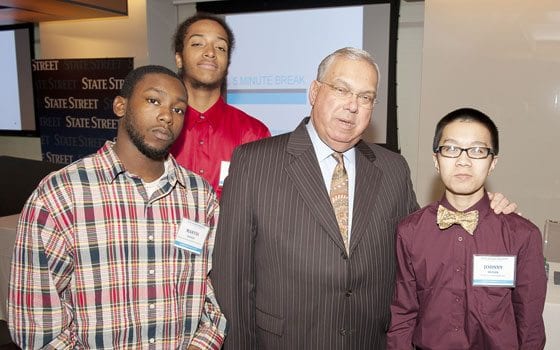

Author: Mark BogaczMayor Thomas M. Menino talks with Boston youths about violence prevention at the third annual symposium on Dec. 7.
State Street Corporation was bustling last week with public and private sponsors, public health representatives, educators and experts in various nonprofit organizations for the shared purpose of discussing youth violence prevention in Boston.
Hosted by the State Street Foundation, the fundraising branch of State Street Corporation, guests and speakers met for the third annual symposium of Youth Violence Prevention Funder Learning Collaborative (YVP Collaborative).
The four-hour meeting and luncheon held last Wednesday covered a myriad of topics, including mental health, mentorship and summer job opportunities for Boston youths.
Opening the discussion was State Street Foundation President George A. Russell Jr., who set the tone of the gathering. Russell explained that the purpose of the symposium was to allow funders to think about the way they invest in youth violence prevention by having open exchanges with experts in the field as well as teens who live in higher risk communities.
The high-risk youth violence areas of Boston include South End/Lower Roxbury, Dudley Square, Grove Hall, Bowdoin/Geneva, and Morton and Norfolk Streets.
David O’Leary, executive vice president and chief administrative officer of State Street Corporation, spoke on behalf of State Street’s commitment to the cause. Taking a holistic approach to the problem, he connected the effects of youth violence to the greater community.
“Violent crime disproportionately affects Boston’s youth,” O’Leary said. “And it affects everyone, [including] small businesses.”
He drew attention to the impact of violence on business owners and jobs, underscoring the importance of a summer jobs program to help reduce violent behavior and improve life for both employers and workers.
Among the other many speakers at the event were Mayor Thomas M. Menino, who emphasized the importance of collaboration, pointing out the long history of Boston’s public and private sector partnerships.
“We’ve got to learn how to work together,” he said. “Boston is one of six cities to develop a comprehensive city plan to reduce youth violence.”
He set forth three goals in the prevention of youth violence. They include a social support system and connection to health and social services; mentorship and a connection to caring adults over a long period of time; and access to meaningful employment that provides opportunities for a future career.
Menino’s primary focus was the summer jobs initiative, which encourages teens to work during their summer vacation and develop essential job skills. He insisted on more participation from larger corporations to put young people to work.
An emphasis on quality and efficiency over quantity emerged from Menino’s speech. Claiming that Boston boasts more nonprofit organizations than any other city in the nation, the mayor joked that everyone in the room had their own nonprofit.
“We don’t have the money we used to have and that money should go to the people who need our help, not to the staff,” he said. “We have enough organizations [. . .] we have to reach out to these folks.”
Among the speakers and panel members were Boston youths who participate and benefit from the violence prevention program.
Frederika Lawson, a 19-year-old youth leader with the Boston Private Industry Council, shared her personal experience with the crowd. Now a student at Bunker Hill Community College, Lawson described the benefits of the summer jobs program.
“Some of us grow up in traumatizing environments and in violent neighborhoods,” she said. “This program has significantly changed my life for the better.”
Lawson claimed that, through the program, she learned responsibility and was held accountable for a signed contract and punctuality; developed job skills as a research assistant at Northeastern University; and participated in community outreach programs.
The funder panel addressed the topics of family support and mental health, youth development and mentoring, and work force development and education.
Among the panelists was David Shapiro, CEO of Mass Mentoring Partnership. He claimed that relationships make a difference in averting violent behavior.
“All youth development work is really violence prevention,” Shapiro said. “This is not ‘squishy’ — I wish I had a better term — but this is concrete.”






